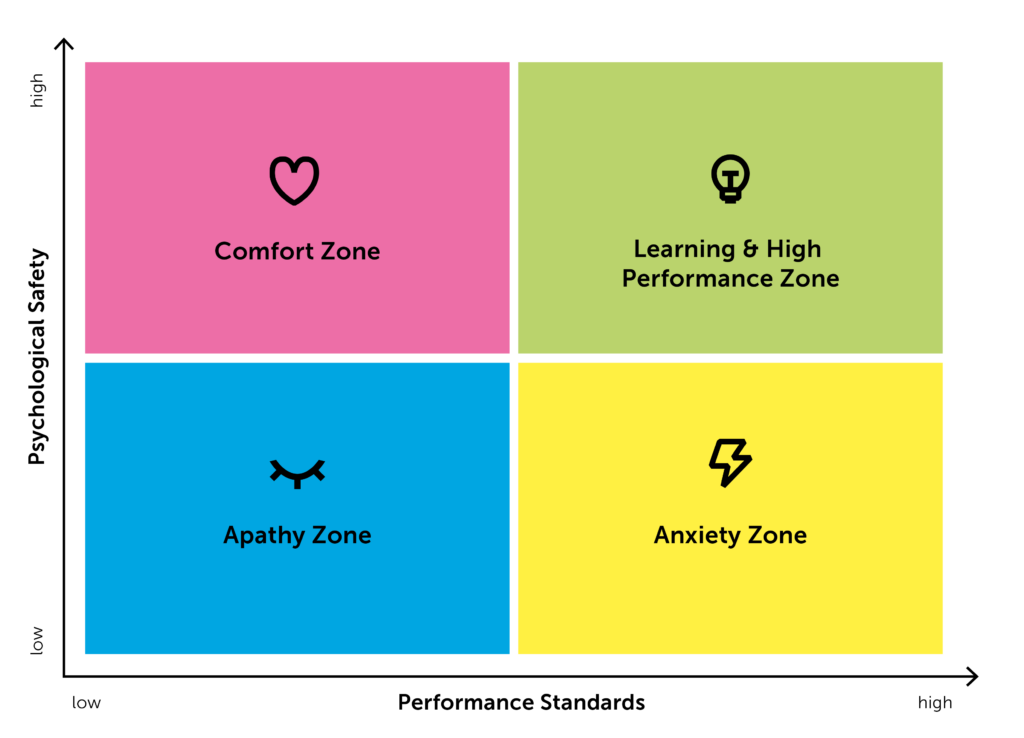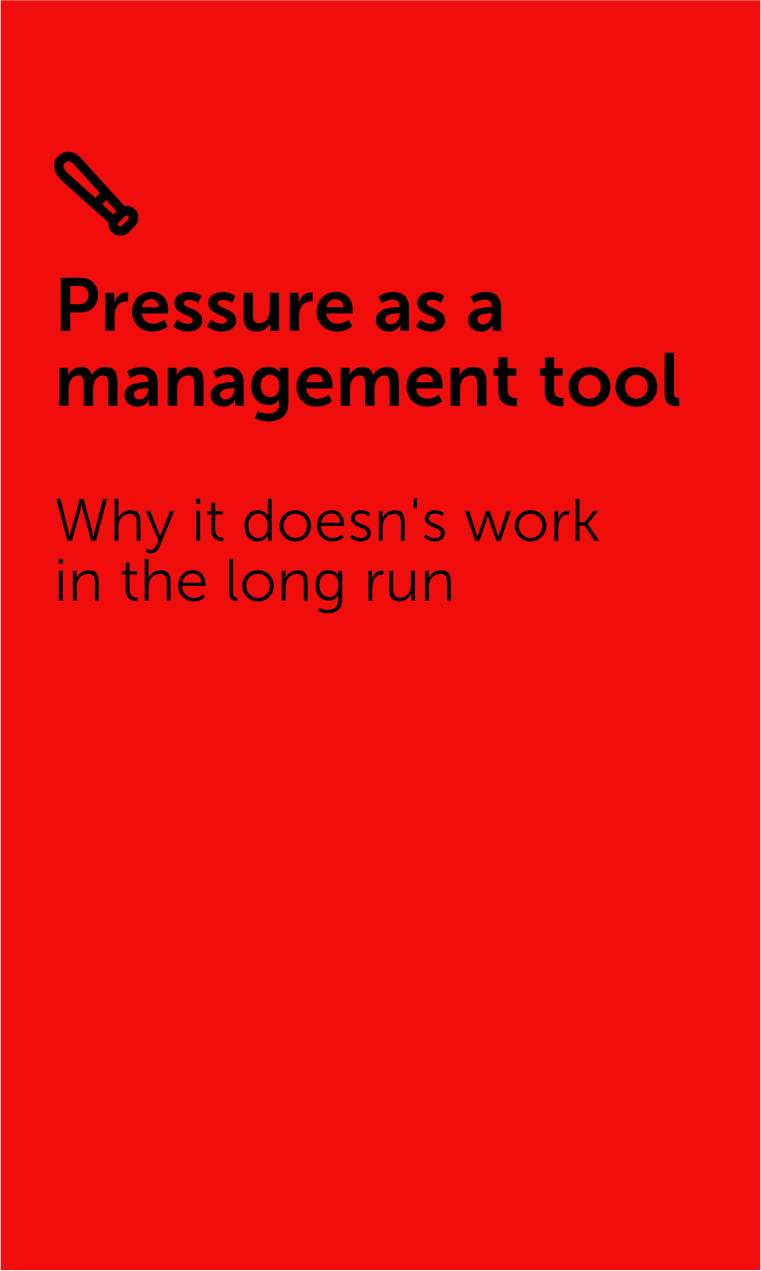Pressure as a management tool – Why it doesn’t work in the long run
It’s Friday morning and the meeting is about to start. The boss enters the room and announces emphatically: “Guys, we absolutely have to meet the deadline this week. The investors are breathing down our necks!” The atmosphere in the room changes immediately – a mixture of nervousness, adrenaline and perhaps even slight reluctance is in the air. Perhaps you are familiar with situations like this, or even more drastic ones, in which a boss puts the entire organization under constant pressure?
At first glance, pressure seems to be an effective tool: it wakes up teams, creates a certain urgency and gets the engine running. But like a car running at full speed: At some point, it smokes.
The short-term effect – sometimes pressure works!
Pressure can actually have a motivating effect in the short term. Studies show that moderate stress – also known as “eustress” – can boost our cognitive abilities in the short term. Daniela Kaufer, a neuroscientist at the University of California, Berkeley, found that acute, manageable stress in controlled situations can sharpen the brain. A small turbo is ignited, so to speak: Thinking becomes more focused, decisions are made faster and the urge to deliver results increases.
A certain amount of pressure can be particularly useful in really critical situations – such as emergency operations. Stress is also an incentive for some sportswomen or professional actors. However, these effects are not only fleeting, but also fragile. Pressure only works if it is clearly limited, well communicated and perceived as a challenge – and not as a threat.
Pressure becomes problematic over time
But what happens when pressure becomes a permanent strategy? It is worth taking a look at Richard Lazarus’ standard work “Stress and Emotion. A new Synthesis”. He is a pioneer of stress research. Back in the 1980s, Lazarus coined the concept that stress always depends on how people perceive a situation. If the stressor – in this case pressure – is a challenge, it spurs us on. If, on the other hand, we perceive it as an obstacle or excessive demand, the downward spiral begins: creativity suffers, performance decreases, and the end result is often health consequences such as burnout or anxiety disorders. Daniel C. Ganster & Christopher C. Rosen provide an overview of the research in the Journal of Management in July 2013. They also show how chronic pressure not only reduces productivity, but can also increase the risk of cardiovascular disease and other health problems.
In addition, such a working style poisons the corporate culture: employees lose trust in their managers, the team structure breaks down and innovative ideas fizzle out because the focus is only on “delivery at any price”. In the worst case, figures are even embellished or even falsified just to avoid having to face an aggressive superior with bad news.
Especially when the pressure turns into uncivilized, rude behavior, the costs for the company are very high. In their Harvard Business Review article, Christine Porath & Christine Pearson describe the various forms of incivility that can become a problem in the workplace. Their examples are varied. In some companies, employees suffer from a “boss from hell” who actively oppresses and insults them. Other times, managers are described as not listening to their colleagues and brushing their ideas off the table. But more subtle forms of rudeness, such as replying to emails during a meeting, also have negative effects. Such rude behavior by superiors often leads to a deliberate reduction in work input, lower quality, less commitment and ultimately even the decision to leave the workplace. At the same time, considerable time and energy is spent processing the situation, complaining to others or avoiding the perpetrator altogether.
Pressure – Management tool with an expiration date
So pressure is like caffeine: in small doses a stimulant, in large doses a health risk. Managers who believe they can achieve top performance with constant pressure are mistaken. Pressure is not sustainable. It may deliver short-term results, but it burns up resources – the mental and physical energy reserves of employees. Too much pressure is counterproductive and even dangerous, especially when dealing with complex challenges. This is where new ideas, creative and perhaps unusual suggestions are needed. Diamonds are created under pressure, but not innovative, well thought-out strategies that are suitable for the challenge.
The alternative: psychological safety instead of constant stress
Instead of relying on constant pressure, contemporary leadership should be based on psychological safety. This means leading teams in such a way that they dare to make mistakes, contribute new ideas and communicate openly. This type of culture not only creates innovation, but also resilience. And it delivers better results in the long term – without employees sneaking home at the end of the week completely burnt out.
This does not mean that ambitious targets should not be set. It’s the quantity that makes the poison. The following graphic, which we have taken from the book “The Fearless Organization. Creating Psychological Safety in the Workplace for Learning, Innovation, and Growth” by Amy Edmondson, shows the connection very well: real high performance can only be achieved with clear and ambitious performance standards in an environment of high psychological safety.

So, at the next meeting: instead of putting pressure on everyone, simply ask: “How can we achieve this goal together without overstretching ourselves?” And ideally, don’t just leave it at this one question, but keep an eye on personal stress levels together with the team using retrospectives, check-ins and other methods. This not only leads to better results, but also to healthier, happier teams.
Leadership development with mermaid & broccoli
In our leadership development journeys, we focus specifically on topics such as psychological safety, feedback culture and the design of results-driven collaboration. If you are interested, please contact us.


